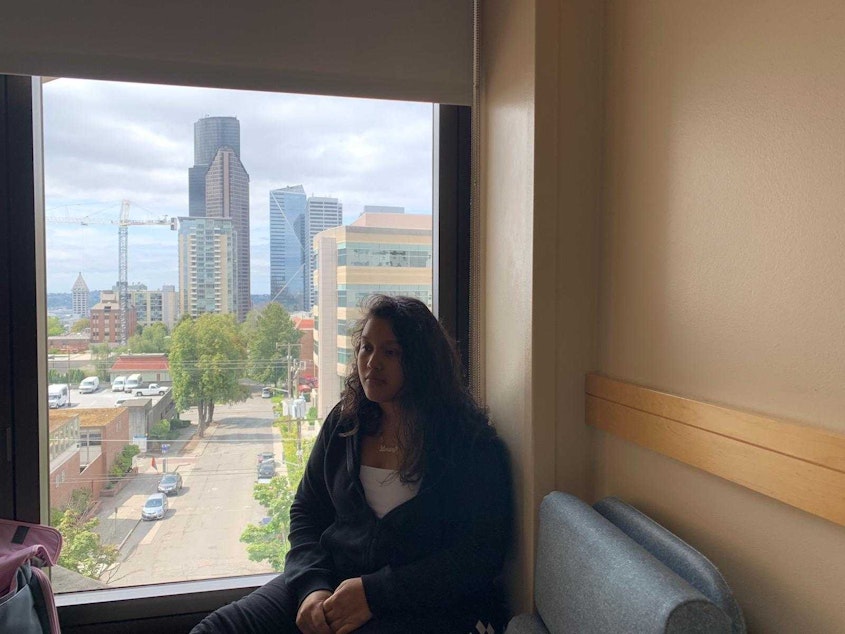Shivering, cold, praying to get out. A Seattle-area teen on surviving homelessness

There are over 12,000 people in Seattle and King County experiencing homelessness. Many of them, including families, live in vehicles.
When I was in 8th grade, my mom and I became homeless, and we lived in our car.
One night, we were parked in Renton, and the police came.
I was in the passenger seat when I heard knocking. My mom woke me up and told me to translate.
My mom remembers what happened: “Un rato me quedé dormida y me llegaron a tocar la ventana del carro así bien fuerte," she said. "I had fallen asleep awhile, and they came and knocked on my window loudly, and they flashed me with a flashlight."
“Yo me espanté mucho," she said. "I was frightened by it."
The police officer told us to hurry up and leave because we were on private property.
We lived in the car over the winter. It was really cold and always raining.
I remember going to sleep every night, praying I would get out of this situation. Shivering and shivering.
I couldn’t get comfortable. My body would ache the next day.
I couldn’t do anything about it because I had no control over the situation.
To get cleaned up in the mornings, we would go to the fast food places.
But the typical fast food place doesn’t offer a place to take a shower. My mother would have to get a hotel once or twice a week to get cleaned up.
Sometimes I would sleep over at my friends’ houses. Whenever they would say, “Make yourself at home,” I would take it literally.
I would laugh. I would take a shower. There were pillows and blankets. I would have a roof over my head. I felt at peace, temporarily.
But no one knew I was homeless. I hid that from them.
My abnormal had become normal.
When I started going to Renton High School, I was still homeless.
I wanted to escape, so I started to get involved in school. I joined clubs and sports teams. I stayed as late as I could doing homework or hanging out with friends, anything to distract me from the numbness I felt and the fact that everything in my life was just temporary, like my past.
Finally, I told Ester Rich, a teacher I trusted, about my living situation.
When I spoke up about being homeless, my feelings started to change. I started to accept my reality and actually believe everything has a purpose in its own way.
Rich told me about an upcoming Jobs for America Graduates convention and insisted I speak.
“You’re a natural leader,” Rich told me. “I wanted people to hear your story.”
In that speech, I talked about how your choices impact others. I said that because of someone else’s choices, I ended up becoming homeless. It was the first time I had said it in front of a group.
I won first place in public speaking.
Later, I went to La Cima, a Latinx Leadership Camp. I had a chance to reflect on who I was and what I wanted in my life.
I realized this burden I carry around is not a pain I deserve.
In the Latinx community, there’s a sense of pride. It was hard for my mother to admit we were homeless. She didn’t even want me to do this story. She was ashamed of what we have been through.
But she did have this to say:
“If I would be able to give advice to someone,” she told me in Spanish, “I would tell them please think things through if they have kids. Don’t make decisions that you will regret later.”
This was a difficult experience for my mom, and for me. I’m not pleased I went through this, but I’m grateful because of it.
My mom and I have housing now.
But I wanted to tell this story because the person you might least expect could be one of those 12,000 homeless people in the Seattle area.
This story was created in KUOW's RadioActive Intro to Journalism Workshop for 15- to 18-year-olds, with production support from Andrew Stuckey. Edited by Carol Smith.
Find RadioActive on Facebook, Twitter and Instagram, and on the RadioActive podcast.
Support for KUOW's RadioActive comes from the Bill & Melinda Gates Foundation Discovery Center.



